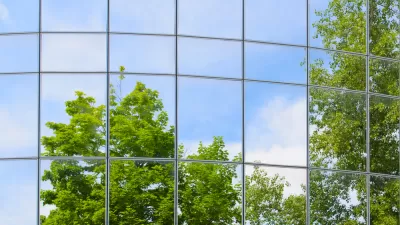Two recent studies on the U.S. Green Building Council's LEED certifications have found that many of the building's with the green certification are actually energy hogs. This piece from The Atlantic offers an explanation.
"Given all the buzz and optimism surrounding green buildings-and the meticulous detail of the LEED rating system-these findings might seem puzzling. But they make more sense up close. Anyone seeking LEED certification can choose from a menu of eco-friendly credits. Instead of selecting energy-minded features like efficient mechanical systems, developers often reach for the low-hanging fruit. They might use paints that have low levels of volatile organic compounds or install cabinets made from rapidly renewable wood. They may opt to recycle their construction waste or increase airflow throughout the building. All of these choices fulfill the 'Environmental Design' half of the LEED bargain, saving trees and improving the quality of human life, and many of them help minimize pollution during the construction phase. But none of them prevents an occupied building from guzzling fuel and pouring greenhouse gases into the atmosphere for years to come."
FULL STORY: The Green Façade

Maui's Vacation Rental Debate Turns Ugly
Verbal attacks, misinformation campaigns and fistfights plague a high-stakes debate to convert thousands of vacation rentals into long-term housing.

Planetizen Federal Action Tracker
A weekly monitor of how Trump’s orders and actions are impacting planners and planning in America.

In Urban Planning, AI Prompting Could be the New Design Thinking
Creativity has long been key to great urban design. What if we see AI as our new creative partner?

King County Supportive Housing Program Offers Hope for Unhoused Residents
The county is taking a ‘Housing First’ approach that prioritizes getting people into housing, then offering wraparound supportive services.

Researchers Use AI to Get Clearer Picture of US Housing
Analysts are using artificial intelligence to supercharge their research by allowing them to comb through data faster. Though these AI tools can be error prone, they save time and housing researchers are optimistic about the future.

Making Shared Micromobility More Inclusive
Cities and shared mobility system operators can do more to include people with disabilities in planning and operations, per a new report.
Urban Design for Planners 1: Software Tools
This six-course series explores essential urban design concepts using open source software and equips planners with the tools they need to participate fully in the urban design process.
Planning for Universal Design
Learn the tools for implementing Universal Design in planning regulations.
planning NEXT
Appalachian Highlands Housing Partners
Mpact (founded as Rail~Volution)
City of Camden Redevelopment Agency
City of Astoria
City of Portland
City of Laramie



























